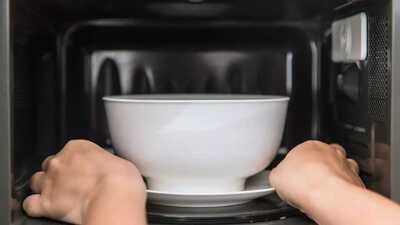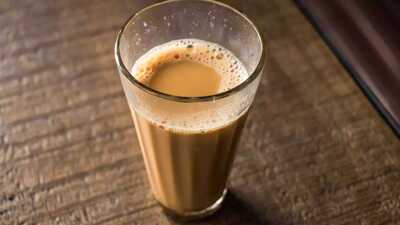Never reheat your tea sounds simple, but many tea lovers in India ignore this advice. That leftover cup of chai from breakfast or lunch may seem harmless, but reheating it can have real health consequences.
A study published in the Journal of Food Science found that reheating tea can degrade beneficial compounds such as catechins and increase harmful substances like biogenic amines, which can affect both taste and health. Millions of Indians rely on chai daily, and this common habit could silently impact digestion, oral health, and overall well-being.
In this article, we explore 5 surprising health risks of reheating tea and suggest safer ways to enjoy your favorite brew.
Why you should never reheat your tea
Reheating tea may seem convenient, but it comes with several hidden risks that affect both taste and health. Understanding these risks can help you make smarter choices and enjoy your chai safely.
Loss of antioxidants in reheated tea

Tea is rich in antioxidants such as catechins and polyphenols that help reduce inflammation, support heart health, and protect cells from damage. Reheating tea breaks down these compounds, meaning your second cup provides far fewer health benefits than the freshly brewed version. For Indian tea lovers , this is especially important because chai often forms part of daily routines, and reducing antioxidant intake over time can affect long-term wellness.
Increased tannins and bitterness in reheated tea
Reheating tea increases tannin concentration, making the drink more bitter and acidic. Tannins can interfere with the absorption of minerals like iron, which is already a concern in plant-based Indian diets. Drinking reheated tea regularly may contribute to digestive discomfort , indigestion, or nutrient deficiencies if consumed multiple times a day.
Bacterial growth in leftover tea
If brewed tea is left at room temperature for too long, bacteria can grow. Reheating tea does not always kill these bacteria, particularly if milk has been added. Milk-based chai is especially vulnerable to bacterial contamination after four hours at room temperature. Drinking reheated tea under these conditions can increase the risk of stomach upset or foodborne illness.
Reheated tea can cause digestive discomfort

Reheating tea can increase its acidity, which may aggravate conditions like heartburn, gastritis, or acid reflux. People who are sensitive to acidic drinks may experience bloating or stomach irritation if they drink reheated tea regularly. Freshly brewed tea is gentler on the digestive system and preserves the natural balance of compounds that aid digestion.
Altered flavor and chemical composition in reheated tea
Repeatedly heating tea can change its flavor profile and chemical composition. The breakdown of compounds not only affects taste but may also result in subtle chemical changes that are undesirable for health. Using non-microwave safe or poor quality vessels can worsen these changes, causing uneven heating and hotspots.
Safer ways to enjoy tea without reheating
Never reheating your tea is not just a precaution for taste, but a health-conscious choice. Reheating reduces antioxidants, increases tannins, promotes bacterial growth, and may cause digestive discomfort. By brewing only what you will drink or using insulated flasks to keep chai warm, you can enjoy your favorite tea while protecting your health. Making small changes in this daily habit ensures that every cup of tea delivers both flavor and wellness.
Disclaimer: This article is for general informational purposes only and is not a substitute for professional medical advice, diagnosis, or treatment. Always seek the guidance of a qualified healthcare provider regarding any medical condition or lifestyle change.
Also read| 7 amazing health benefits of lauki juice on an empty stomach
A study published in the Journal of Food Science found that reheating tea can degrade beneficial compounds such as catechins and increase harmful substances like biogenic amines, which can affect both taste and health. Millions of Indians rely on chai daily, and this common habit could silently impact digestion, oral health, and overall well-being.
In this article, we explore 5 surprising health risks of reheating tea and suggest safer ways to enjoy your favorite brew.
Why you should never reheat your tea
Reheating tea may seem convenient, but it comes with several hidden risks that affect both taste and health. Understanding these risks can help you make smarter choices and enjoy your chai safely.
Loss of antioxidants in reheated tea
Tea is rich in antioxidants such as catechins and polyphenols that help reduce inflammation, support heart health, and protect cells from damage. Reheating tea breaks down these compounds, meaning your second cup provides far fewer health benefits than the freshly brewed version. For Indian tea lovers , this is especially important because chai often forms part of daily routines, and reducing antioxidant intake over time can affect long-term wellness.
Increased tannins and bitterness in reheated tea
Reheating tea increases tannin concentration, making the drink more bitter and acidic. Tannins can interfere with the absorption of minerals like iron, which is already a concern in plant-based Indian diets. Drinking reheated tea regularly may contribute to digestive discomfort , indigestion, or nutrient deficiencies if consumed multiple times a day.
Bacterial growth in leftover tea
If brewed tea is left at room temperature for too long, bacteria can grow. Reheating tea does not always kill these bacteria, particularly if milk has been added. Milk-based chai is especially vulnerable to bacterial contamination after four hours at room temperature. Drinking reheated tea under these conditions can increase the risk of stomach upset or foodborne illness.
Reheated tea can cause digestive discomfort
Reheating tea can increase its acidity, which may aggravate conditions like heartburn, gastritis, or acid reflux. People who are sensitive to acidic drinks may experience bloating or stomach irritation if they drink reheated tea regularly. Freshly brewed tea is gentler on the digestive system and preserves the natural balance of compounds that aid digestion.
Altered flavor and chemical composition in reheated tea
Repeatedly heating tea can change its flavor profile and chemical composition. The breakdown of compounds not only affects taste but may also result in subtle chemical changes that are undesirable for health. Using non-microwave safe or poor quality vessels can worsen these changes, causing uneven heating and hotspots.
Safer ways to enjoy tea without reheating
- Brew only the amount you plan to drink immediately.
- Store brewed tea in a sealed container and refrigerate if you want to keep it for later.
- Use a thermos or insulated flask to keep tea warm without reheating.
- Add milk or sugar fresh rather than reheating milk tea together.
- If reheating is unavoidable, heat gently on low heat instead of boiling.
Never reheating your tea is not just a precaution for taste, but a health-conscious choice. Reheating reduces antioxidants, increases tannins, promotes bacterial growth, and may cause digestive discomfort. By brewing only what you will drink or using insulated flasks to keep chai warm, you can enjoy your favorite tea while protecting your health. Making small changes in this daily habit ensures that every cup of tea delivers both flavor and wellness.
Disclaimer: This article is for general informational purposes only and is not a substitute for professional medical advice, diagnosis, or treatment. Always seek the guidance of a qualified healthcare provider regarding any medical condition or lifestyle change.
Also read| 7 amazing health benefits of lauki juice on an empty stomach
You may also like

PM Modi to visit Maharashtra on October 8-9; to inaugurate Navi Mumbai airport, host UK PM Keir Starmer

"NDA will form govt again": LJP (RV)'s Shambhavi Choudhary on Bihar polls

"Black day for India": Supriya Sule condemns shoe-hurling attempt at CJI

'How To Kill My Friend': 13-Year-Old Raises Weird Query To ChatGPT, Ends Up In Jail

Tension grips Agartala after Trinamool office 'attack'





